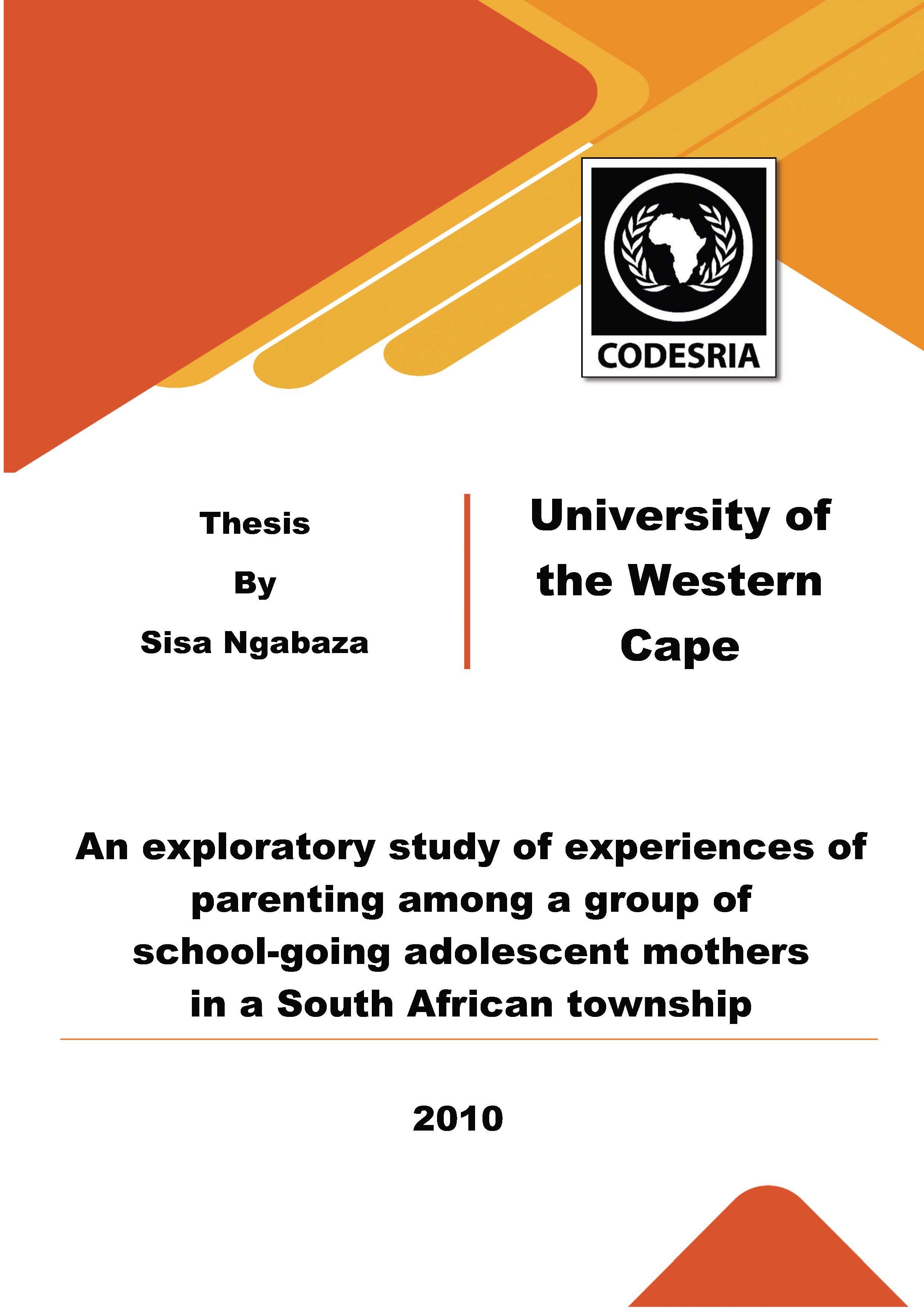An exploratory study of experiences of parenting among a group of school-going adolescent mothers in a South African township
Keywords:
Gendered experiences, motherhood, adolescent pregnancy, learners, schooling, Khayelitsha, feminist qualitative methodology, life history narratives, interviews, narrative thematic analysisSynopsis
Adolescent pregnancy and motherhood have been given considerable attention in the South African education system. Before 1994 pregnant adolescents were expelled from school (as the policy then stipulated) until they delivered their babies. With the adoption of new national legislation, current policies, the South African Schools Act no 84 of 1996, and the Department of Education 2007 policy on management of learner pregnancy in schools emphasise that equal education must be provided for all learners, thus abolishing the exclusion of pregnant learners from mainstream education. Although pregnant learners have
been retained in schools, a handful of studies reveal that schools’ management of pregnant learners is fraught with inconsistencies. This study explored adolescent girls’ subjective experiences of being young mothers in school, focusing on their personal and interpersonal relationships within their social contexts. Participants included 15 young black mothers aged
between 16 and 19 years from three high schools in Khayelitsha, Cape Town. Conducted within a feminist social constructionist framework, the study adopted an exploratory qualitative structure. Data were collected through life histories that were analysed within a thematic narrative framework. The narratives revealed that the young mothers found motherhood challenging and overly disruptive of school. Although contexts of childcare emerged as pivotal in how young mothers balanced motherhood and schoolwork, these were also presented as characterised by notions of power and control. Because of the gendered nature of care work, the women who supported the young mothers with childcare dominated the mothering spheres. The schools were also experienced as controlled and regulated by authorities in ways that constrained the young mothers’ balancing of school and parenting. Equally constraining to a number of adolescent mothers were structural challenges, for example, parenting in spaces that lacked resources. These challenges were compounded by the immense stigma attached to adolescent motherhood. The study recommended that the Department of Education work closely with all the parties concerned in ensuring that pregnant learners benefit from the policy. It is necessary that educators are encouraged to shift attitudes so that communication with adolescent mothers is improved.
Downloads
References
Rutenberg, N., Kaufman, C.E., Macintyre, K., Brown, L. & Karim, A. (2003). Pregnant or positive: Adolescent childbearing and HIV risk in Kwazulu Natal, South Africa. Reproductive Health Matters 11(22), 122-133.
Salo, E. (2007). Social constructions of masculinity on the racial and gendered margins of Cape Town. In T. Shefer, K. Ratele, A. Strebel, N. Shabalala, & R. Buikema (Eds.), From boys to men: Social constructions of masculinity in contemporary society (pp. 160-180). Cape Town: UCT Press.
Samuel, J. (1990). Education: From poverty to liberation. Cape Town: David Phillip.
Santelli, J.S., Lindberg, L.D., Finer, L.B. & Singh, S. (2007). Explaining recent declines in adolescent pregnancy in the United States: The contribution of abstinence and improved contraceptive use. Contemporary Sexuality, 41, 8-12.
Schoefield, G. (1994). The youngest mothers. London: Sage.
Schwandt, T. A. (2000). Three epistemological stances for qualitative inquiry: Interpretivism, hemeneutics and social sonstructionism. In N.K. Denzin & Y.S. Lincoln (Eds.), Handbook of qualitative research (pp. 190-215). Thousand Oaks: Sage.
Scutt, J. (1990). Women's bodies, patriarchal principles: Genetic and reproductive engineering and the law. In J. Scutt (Ed.), The baby machine: Reproductive technology and the commercialisation of motherhood. London: The Merlin Press.
Seamark, C.J. & Lings, P. (2004). Positive experiences of teenage motherhood: A qualitative study. British Journal of General Practice, 54, 813-818.
Secco, M.L., Ateah, C., Woodgate, R. & Moffatt, M.E.K. (2002). Perceived and performed infant care: Competence of younger and older adolescent mothers. Issues in Comprehensive Paediatric Nursing, 25, 97-112.
Segura, D. (1994). Feminist perspectives on mothering and peace. In E.N. Glenn, G.
Chang, & L.F. Forcey (Eds.), Mothering, ideology, experience and agency (pp. 211-233). New York: Routledge.
Selman, P. & Hosie, A. (2005). The education of pregnant young women and young mothers in England. Bristol: Unpublished Research Paper, Teenage Pregnancy Unit.






